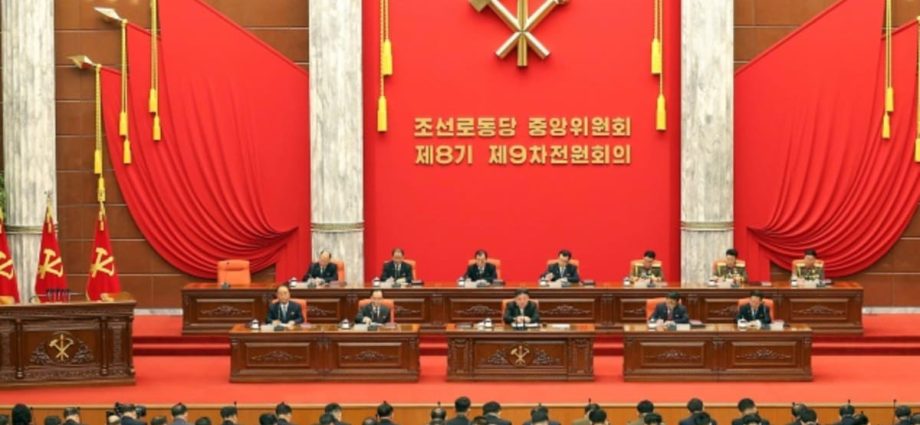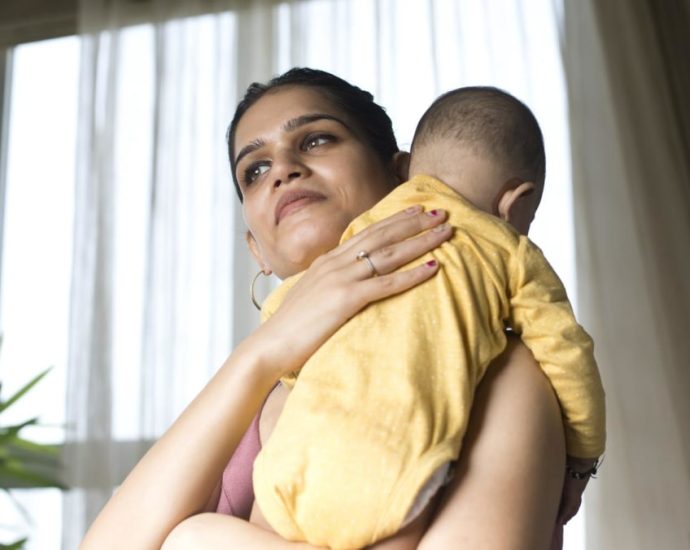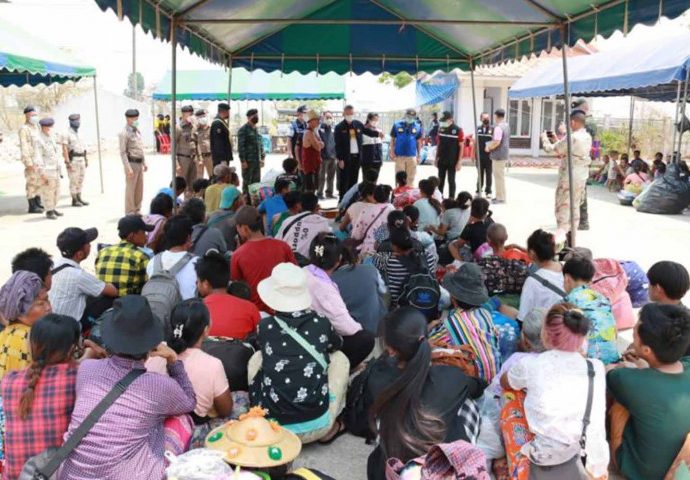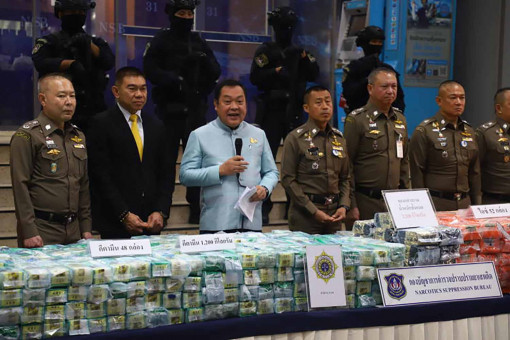North Korea kicks off key party meeting ahead of new year
SEOUL: North Korea has opened a year-end ruling party meeting attended by leader Kim Jong Un, state media said on Wednesday (Dec 27), with key policy decisions for 2024 expected to be unveiled. Abandoning a once-traditional New Year’s Day speech, Kim has in recent years used the Workers’ Party ofContinue Reading
Grace Millane’s mother wants to ‘make the world a better place’
 Millane family
Millane familyGrace Millane had dreamed of travelling the world since she was a little girl.
“I found a school project she did about New Zealand and it said ‘I’m going there one day’. And she did get there,” her mother Gillian says, proudly.
Growing up in Wickford in Essex, Grace was a livewire who made friends wherever she went.
“She was my best friend, we would always disappear to the pub for a quick drink and we would go away on holiday together,” Gillian says.
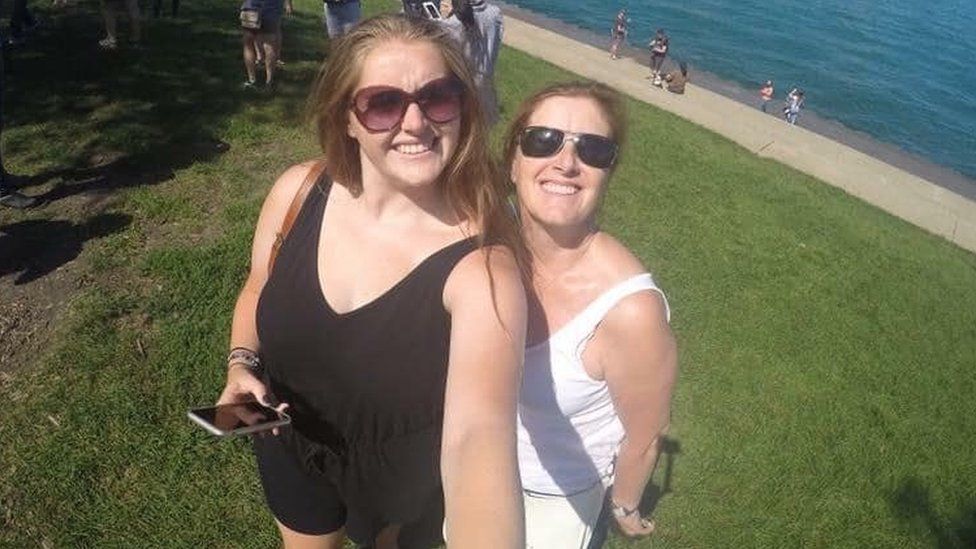
Five years ago, after graduating from the University of Lincoln, Grace set out on a year-long solo backpacking adventure across the world.
After a six-week tour of Peru, she arrived in New Zealand. Less than a fortnight later, on the eve of her 22nd birthday, she was strangled to death by a man she met on a dating app.
Grace was constantly in touch with her family but had not responded to their birthday messages on 2 December, so they reported her missing to the police.
Gillian was recovering from surgery for breast cancer and not able to join the search. Her husband, Grace’s father David, flew out to New Zealand but a week later, their daughter’s body was found in bushland on the outskirts of Auckland.
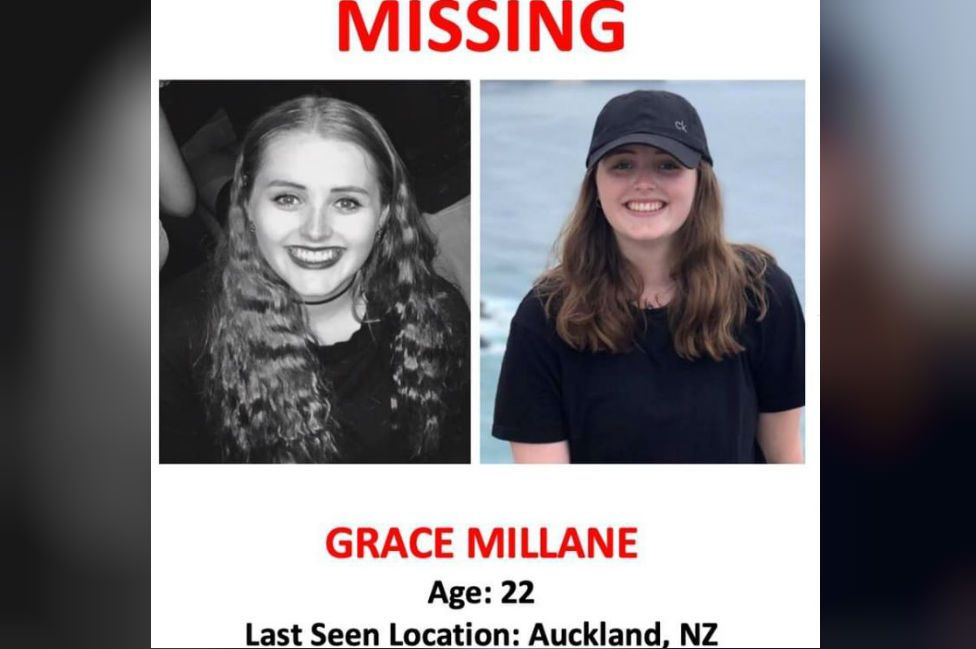
During a three-week trial, the family had to sit through her killer’s attempts to pass the murder off as “rough sex” gone wrong and his claims that Grace asked to be strangled.
“I felt like Grace was on trial and she couldn’t defend herself. As a parent, I didn’t want to listen to that. It was horrendous.
“You can’t ask for your own death. It is ludicrous this can be used as a defence.”
A jury unanimously convicted him of murder and he was sentenced to life in prison.
The family decided never to mention his name again. “We never say it. It’s a waste of energy. I don’t care about him, I don’t think about him,” Gillian says.
Gillian has since campaigned against the rough sex defence, with the charity We Can’t Consent To This, and has helped to change the law in England and Wales.
Two years after Grace’s murder, Gillian’s husband David died from cancer, which left her in a “really dark place”.

Gillian credits her family and friends, long walks and “lots of counselling” for her still being here today.
“I did contemplate suicide. That is a horrid place to be. But I couldn’t bring any more sadness to the family. Grace had such a bright future and it was taken away from her and us.
“I will never see Grace in a wedding dress or see her grandchildren. This is a life sentence I’ve got. This is me until the day I die. But there is a light and I found it. You have to find that inner strength.”
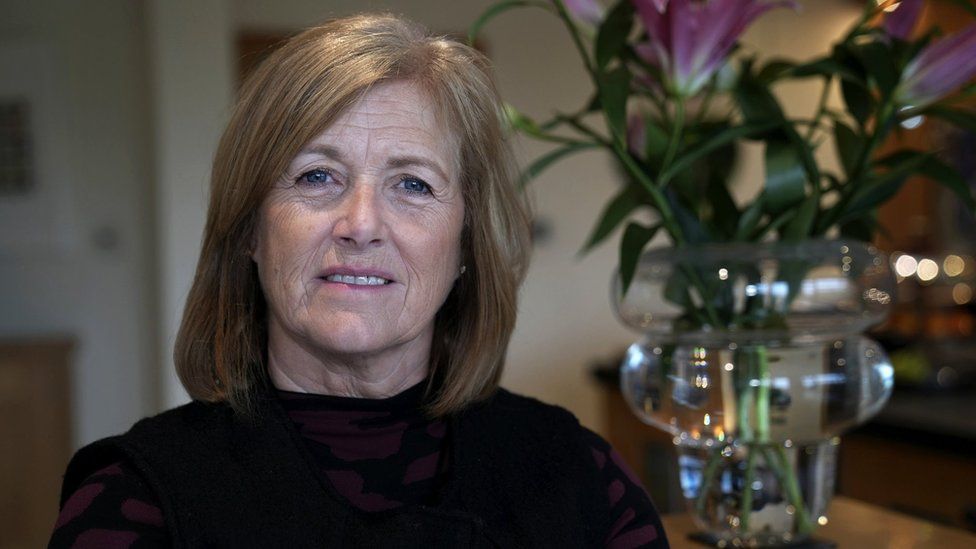
David died during Covid and they could not be together as a family but Gillian later threw a memorial party and it became a turning point.
“A friend dragged me up to dance. I wasn’t sure if it was the right thing to do but I laughed and I looked around the room and everyone was smiling.
“My toes stay in the darkness but the rest of me is facing the sun a bit. Sometimes it goes up to my waist and I do go into that black hole but I have people behind me who support me.”
Christmas is a very difficult time for Gillian, so last year she decided to spend it climbing Mount Kilimanjaro, which was “incredibly emotional”.

“I went from not wanting to leave the house to climbing a mountain on the other side of the world.
“I had to train and be focused. I didn’t realise the power it was giving me and how much it was helping me.
“Everything was aching but I knew Grace and David would be pushing me up there. They wanted to still be here, they didn’t want to go, so I thought ‘right get up there’.”
Gillian left a stone for Grace and David at the top, in tribute to them.
“Whenever I go somewhere special, I put the stones there, so they are travelling. If someone picks a stone up and moves it, they go somewhere else.”
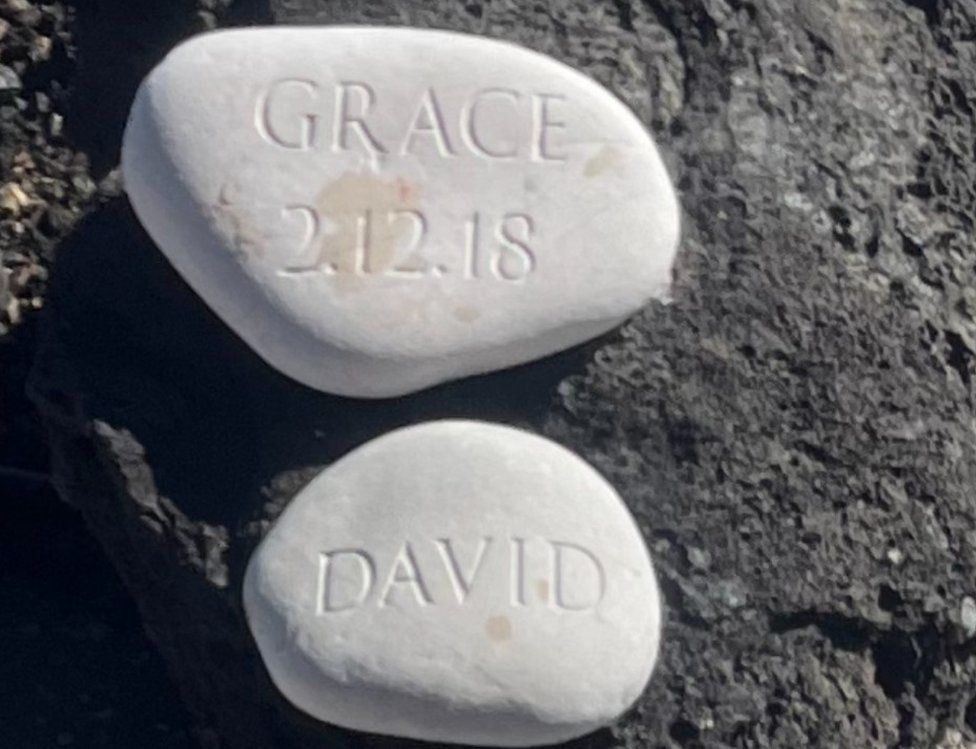
Her efforts raised £33,000 for the White Ribbon charity, which aims to end male violence against women. Gillian received a thank you card from the charity, saying the money had been used to fund education programmes in 65 schools in the Hull area.
“I just want to raise awareness and get that message out there about violence against women so that no other family has to live this life I live,” Gillian says.
Four years ago, with her niece Hannah, Gillian started the charity initiative Love Grace. They collect donated handbags and fill them with toiletries for domestic abuse victims.
So far, they have filled 15,600 bags for women in the UK and across the world and they received an award from the prime minister.
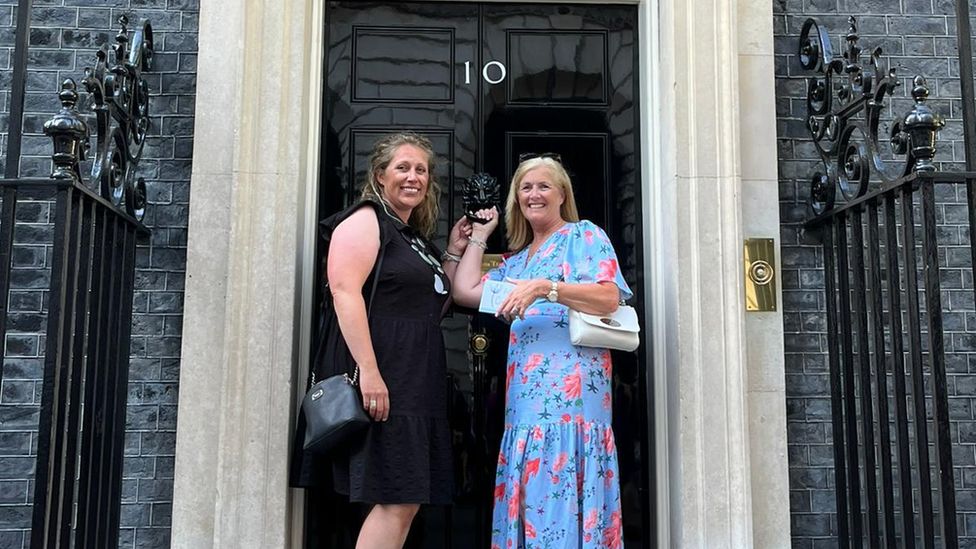
Grace loved handbags, Gillian says, and each bag has a tag on it with her handwriting.
“It’s a simple idea but it has really taken off,” Gillian says. “We were just doing it for our grief so that Grace would never just be a number.
“They get this bag, they are not expecting it and they have gone through hell. We get hundreds of letters from people who have received the bags, it’s heartbreaking.”
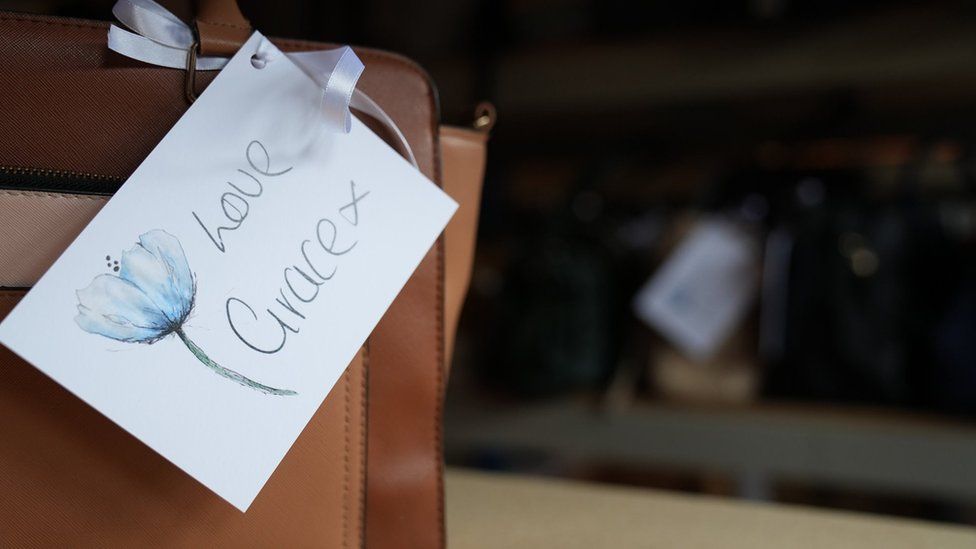
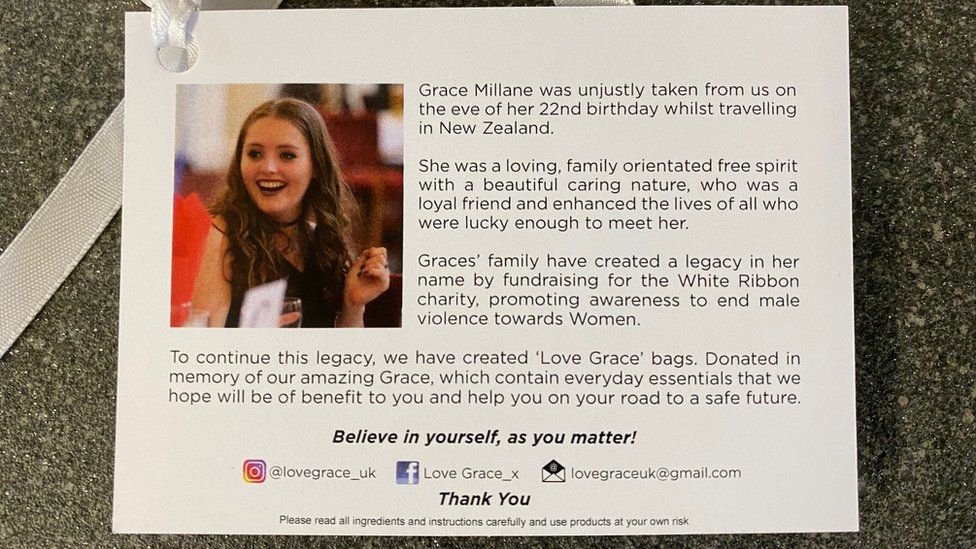
Next year, Gillian is applying for Love Grace to become an official charity and she will be training for a trek to Everest basecamp in September, with a plan to place two more stones there.
One day she hopes to travel to New Zealand, a country which Gillian says has really taken Grace to their hearts.
“I still get loads of messages of support from there. It wasn’t New Zealand or travelling that killed Grace, or anything she did. It was that individual.”
Five years on from her daughter’s death, living without Grace has not got any easier. But Gillian is still trying hard to face the sun.
“I should never have buried my child and certainly she should never have died the way she did. People keep saying I’m really strong but I don’t think so, I’m just a mum.”
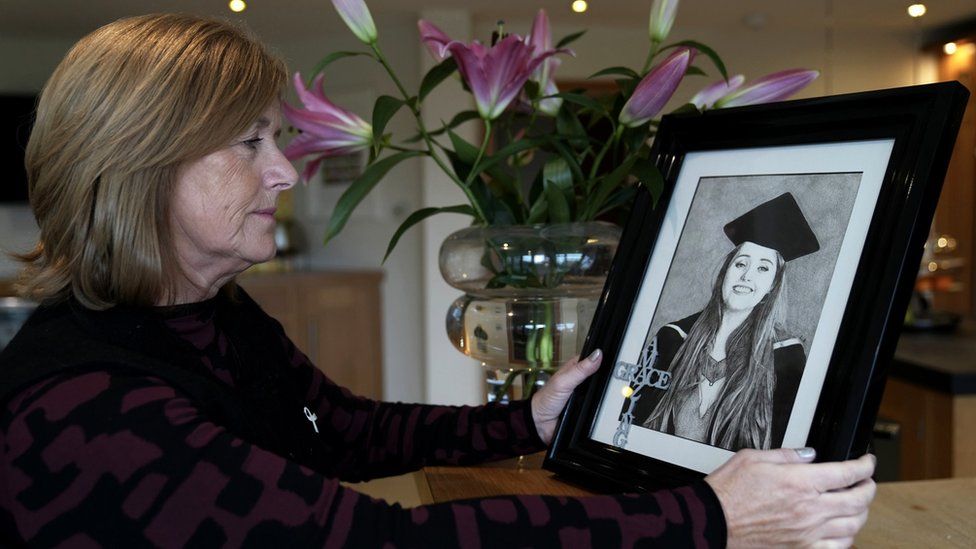
She adds: “I am more resilient than I ever thought I was. I do think David and Grace would be proud. I think Grace would laugh and say these treks are a mid-life crisis.
“I will never get over it but I just know I’ve got to make the world a better place. I want to change things so that no other family has to go through what we go through. That has got to be a good thing.”
If you, or someone you know, is feeling emotionally distressed, BBC Action Line has put together a list of organisations which can help.

Follow East of England news on Facebook, Instagram and X. Got a story? Email [email protected] or WhatsApp 0800 169 1830
Related Topics
-
-
17 November 2022

-
-
-
19 November 2020

-
-
-
10 October 2019

-
Related Internet Links
‘Godfather’ of avocado toast chef Bill Granger dies, aged 54
 Mikkel Vang
Mikkel VangRenowned Australian chef Bill Granger – the “godfather” of avocado toast – has died.
A self-taught cook from Melbourne, Granger became a celebrated global restaurateur and food writer.
He passed away in a London hospital on Christmas Day, aged 54, his wife and three daughters by his side.
“He will be remembered as the ‘King of Breakfast’, for making unpretentious food into something special filled with sunshine,” they said on Instagram.
“He will be deeply missed by all.”
His cause of death has not been made public.
Over his 30-year career, Granger published 14 cookbooks, made multiple television cooking shows, and opened more than a dozen restaurants in cities like Sydney, London, and Tokyo.
Granger was beloved by diners across the world, but also by his fellow chefs.
“I’m heartbroken to hear this. So cruel,” food author and TV chef Nigella Lawson wrote on Instagram.
Meanwhile culinary legend Jamie Oliver paid tribute to Granger as “a wonderful human” and a “kind, calm soul”.
“I admired everything he represented in food,” he wrote on Instagram.
Granger began his career in 1993, after he dropped out of art school to open his first restaurant in Sydney when he was just 23 years old.
Bills – a sunny corner cafe – became renowned for simple dishes like avocado toast, ricotta pancakes with honeycomb butter, and top-quality coffee.
Its popularity exploded, and from there he opened offshoots abroad – including an entire chain of Granger & Co. restaurants in London.
Australian chef Darren Robertson said Granger had “changed the entire breakfast game” while Masterchef Australia alumnus Adam Liaw described him as “arguably [the] most influential pioneer of modern Australian food”.
“His ‘sunny’… codification of Australian cafe culture at Bills is the model on which every Australian cafe around the world is now built. Bloody great guy, too.” Liaw wrote on X, formerly known as Twitter.
Such was his impact that in January, Granger was recognised with the Medal of the Order of Australia – one of the country’s top honours – for his contribution to tourism and hospitality.
Speaking to the BBC in 2019, the chef reflected on the humble foundations of his breakfast empire.
“I’ve done all these extraordinary things, just from liking to cook pancakes and scrambled eggs, which is pretty amazing.”
Granger is survived by his wife and business partner, Natalie Elliott, and his three daughters, Edie, Inès and Bunny.
This video can not be played
To play this video you need to enable JavaScript in your browser.
Related Topics
âItâs not just hormonesâ: Current management of postpartum depression falls short, more intervention needed
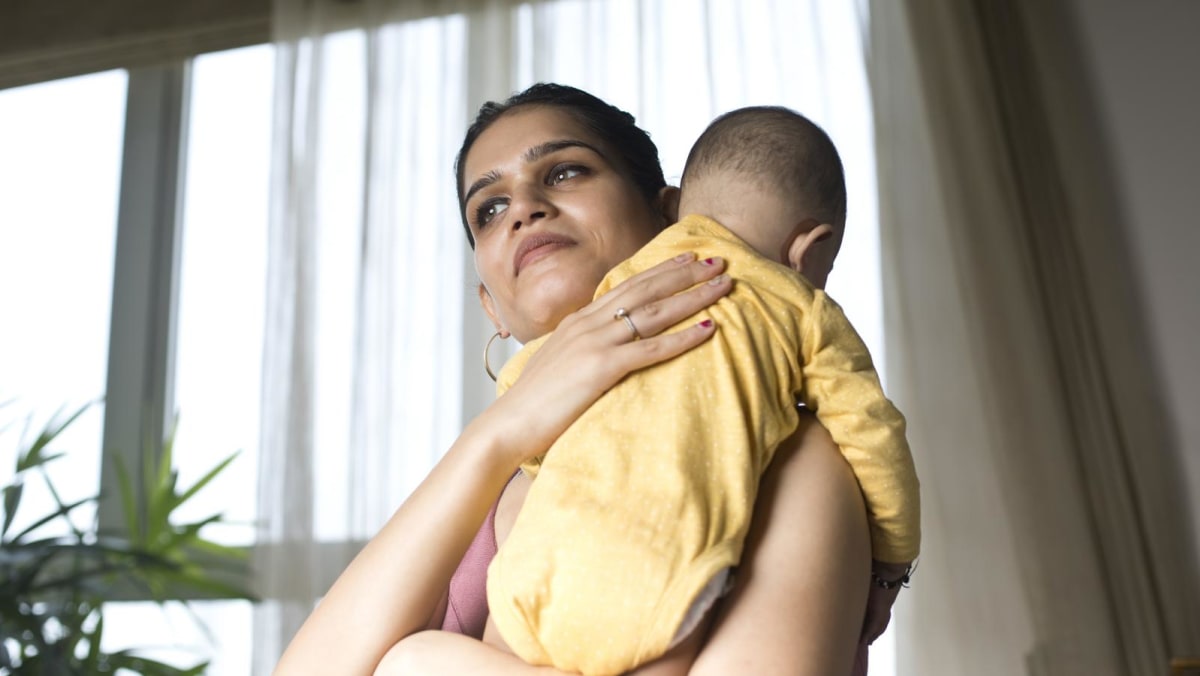
Multiple factors can increase the risk of a mother developing postnatal depression, said Dr Lee. These include:
- History of depression or mental illness
Women with pre-existing depression or other mental illnesses may be more susceptible to the negative emotions associated with postnatal depression.
- Past upbringing or difficult relationship with own mum
Women who had a tough relationship with their mothers as children may carry emotional baggage into motherhood. This can cause them to exert too much pressure on themselves as new mums, eventually leading to heightened stress and a higher risk of depression.
- Complicated pregnancy
Women who had a challenging pregnancy, experiencing both physical and mental distress, may have heightened anxiety after giving birth.
- Assisted pregnancy (IVF or IUI)
Conceiving through assisted reproduction such as in-vitro fertilisation (IVF) or intra-uterine insemination (IUI) can make the baby even more precious to the mother, intensifying her concerns about potential complications during childbirth and thus, increasing her anxiety.
- Premature birth and NICU stay
Mothers of premature infants, particularly those admitted to the neonatal intensive care unit, often grapple with anxiety and depression due to the intense worry they have about their baby’s health and treatment.
- Social factors
Single mothers, those facing financial challenges, individuals with many children, or those lacking a supportive spouse or family unit may experience increased stress in caring for a newborn, thereby elevating the risk of postpartum depression.
Woman paraded naked: A familiar headline in India
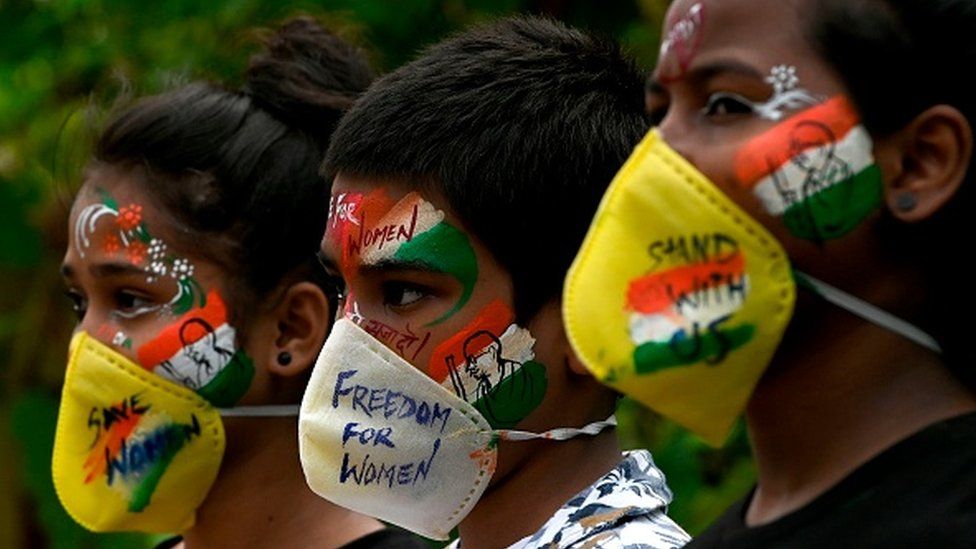 Getty Images
Getty ImagesEarlier this month, a woman was stripped and paraded naked in India, sparking outrage. It’s a depressingly familiar headline, but legal experts and gender rights activists say the law is still not equipped to deal with such heinous crimes against women.
Warning: This article contains details some readers may find distressing.
It was sometime after 1am on 11 December when more than a dozen people barged into Sasikala’s [not her real name] house.
The 42-year-old was dragged out, stripped and paraded naked around the village, tied to an electricity pole and beaten for hours.
A resident of Hosa Vantamuri village in Belagavi district in the southern Indian state of Karnataka, she was being punished because her 24-year-old son had eloped with his 18-year-old girlfriend.
The young woman had been betrothed by her family to another man and was to get married the next day. Her furious family wanted to know where the couple were.
The police reached the village around 4am after they received a tip-off and rescued Sasikala and took her to hospital. She’s reported to be suffering from severe trauma. Her husband later told a visiting state minister that “my wife and I didn’t even know about the relationship”.
More than a dozen people have been arrested and a local police officer has been suspended for “dereliction of duty”.
The incident made national headlines and authorities took notice. Karnataka Chief Minister Siddaramaiah called it an “inhuman act” and promised justice to her.
The government also gave her some agricultural land and money, although authorities have acknowledged there could be no compensation for the humiliation she endured.
Karnataka high court Chief Justice Prasanna Varale and Justice MGS Kamal, who summoned the police and initiated a hearing on their own, said they were “shocked” that such an incident could take place in modern India.
But the incident in Belagavi is not really rare and several similar incidents have made headlines in India in recent years.
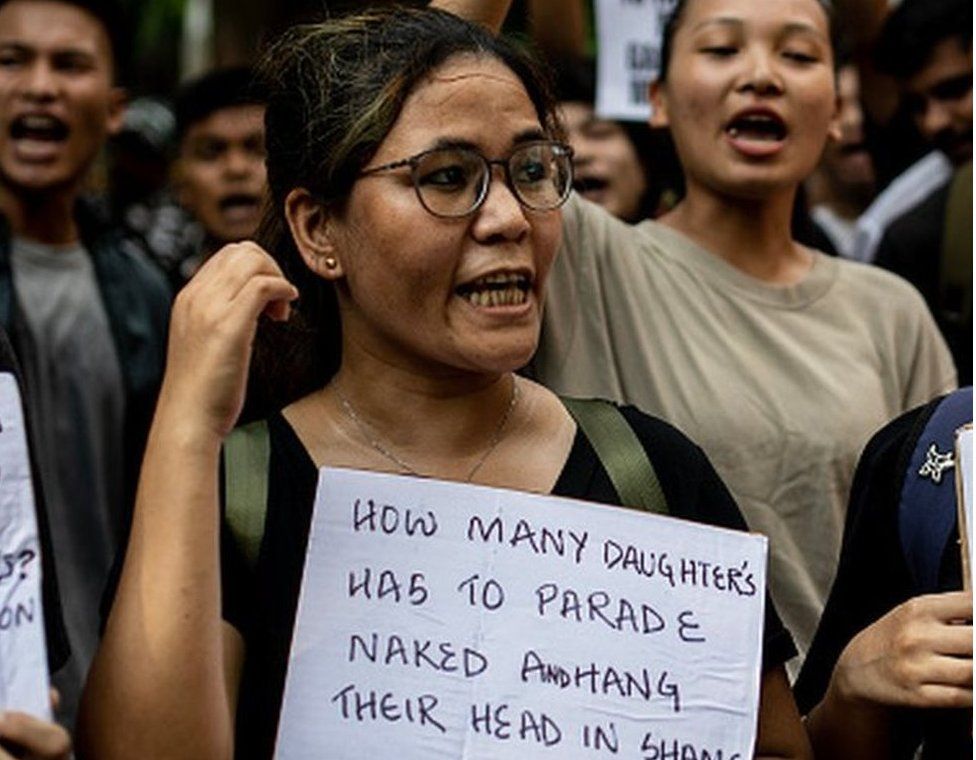

One such story that sparked global outrage came from the north-eastern state of Manipur in July. A viral video showed two women being dragged and groped by a mob of men before one of them was allegedly gang-raped.
The horrific attack had a political angle – Manipur was gripped by violent ethnic clashes involving the Kuki and Meitei communities.
But reports from other states show such incidents are often rooted in caste or familial conflicts, with women’s bodies routinely becoming the battleground.
In August, a 20-year-old pregnant woman was paraded naked in Rajasthan by her husband and in-laws after she reportedly left him for another man. A 23-year-old tribal woman in Gujarat was punished in a similar manner for eloping with another man in July 2021.
In May 2015, five Dalit women were paraded naked and caned by members of a higher caste in Uttar Pradesh after one of their girls eloped with a Dalit boy. In 2014, a 45-year-old woman in Rajasthan was paraded naked on a donkey after being accused of killing her nephew.
These are just some cases that made headlines, but there’s a general lack of data on such incidents. Some cases get politicised, with opposition parties raising them to embarrass a state government. But activists say women often do not report these crimes because of fear of insensitive questioning by the police and in courts.
“Cases involving assault of women are always under-reported because of shame. Families don’t come forward because it’s a matter of honour and the system does not support the survivors or give them a safe space to report these crimes,” says lawyer and rights activist Sukriti Chauhan.
In the National Crime Records Bureau database, disrobing is recorded under a broad description called “assault with intent to outrage [a woman’s] modesty”, which clubs the crime with cases of street harassment, sexual gestures, voyeurism and stalking. Last year, 83,344 such cases were recorded with 85,300 affected women.
Such cases are dealt with under article 354 of the Indian Penal Code and are punishable by a mere three to seven years in jail – which, Ms Chauhan says, is “grossly inadequate”.
“It’s a mockery of justice. Law works only when it deters. Right now this law is not a deterrent and that undermines women. It needs to be amended to enhance the punishment,” she says.
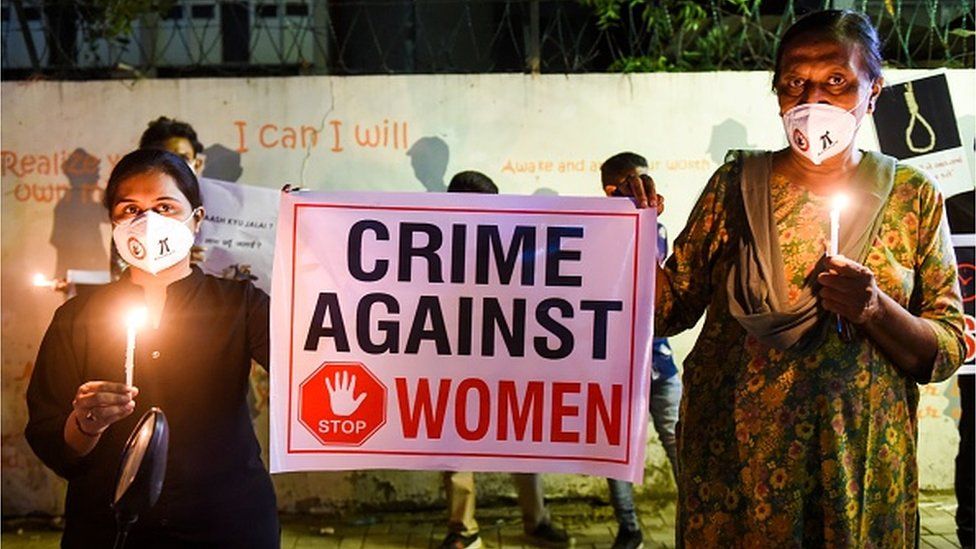
In the Karnataka high court, the justices also noted that the assault in Belagavi was watched by “a crowd of 50-60 villagers”, adding that “only one man tried to intervene and he was also beaten up”.
Highlighting the need for “collective responsibility” to stop such atrocities, the judges cited a case from the 1830s – when India was governed by the British – pointing out that an entire village was made to pay for a crime.
“All village people should be made responsible… Somebody could have tried to stop that,” they said.
Chief Justice Varale also invoked Draupadi from the epic Mahabharat, who’s saved by Hindu god Krishna when she’s being disrobed, to advise women “to pick up arms as no god will come to protect you”.
That advice, Ms Chauhan believes, is not practical.
“We are not Draupadis and there are no weapons to be picked up. Also, the onus cannot be on women. The law has to talk to the wrongdoer, but it’s still telling women that they have to find a way to stay safe,” she says.
“The message we need to get across is stop fighting your ethnic, caste and family battles on our bodies, they are not your battlefield,” she adds.
Maumil Mehraj, a research analyst who works with young people on gender equity, says the reason a woman’s body is treated as a battlefield is because it’s connected to her – and by extension her family, caste and community’s – honour.
“It’s always why women disproportionately have to bear the brunt during conflicts,” she says.
Such incidents, she says, also have an element of voyeurism because they are seen, photographed and filmed.
In Belagavi, she says, one of those arrested is a minor, indicating that such crimes have been normalised to such an extent that even the next generation has grown up with entrenched gender ideas.
“So will a law be enough to deal with such cases? I think the only solution is bringing up better boys. It’s necessary to teach them that connecting a woman’s body to her honour is problematic,” she says.
“It’s a Herculean task, but has to start early. Otherwise this vicious violence against women will continue.”
BBC News India is now on YouTube. Click here to subscribe and watch our documentaries, explainers and features.

Read more India stories from the BBC:

Related Topics
New centre ‘can handle’ refugee flood
Border plan to aid Myanmar civilians
PUBLISHED : 27 Dec 2023 at 06:06

The Ministry of Foreign Affairs has floated the idea of setting up a centre along the Thai-Myanmar border to provide humanitarian assistance for Myanmar refugees desperate to escape internal fighting between junta forces and insurgent ethnic minority groups.
Foreign Minister Parnpree Bahiddha-nukara said on Tuesday the ministry has been holding talks with its Myanmar counterpart about the centre for some time after learning about the perilous situation inside Myanmar.
“Thailand shares approximately 2,400 kilometres of border with Myanmar. [That’s why] Thailand can’t stay still and has to provide [humanitarian] assistance to Myanmar refugees,” he said.
He said if the centre is finally set up, it will also serve as a channel for transport, medication and food for those affected by the fighting inside Myanmar.
Mr Parnpree said the ministry is now in talks with the Myanmar government and some ethnic minority groups. They agreed in principle with the idea, but more discussion is needed. He added that Myanmar will send a working team to attend a meeting with the ministry in Thailand early next month to discuss the matter.
Aside from that, they are expected to come up with measures to handle any future influx of refugees into Thailand, he said.
Asked if it is high time for Thailand to review Asean’s five-point consensus that calls for an end to violence and dialogue among all parties, Mr Parnpree said Thailand still supports the five-point consensus.
Mr Parnpree said Thailand has maintained a good friendship with Myanmar, but, as an Asean member itself, the Thai government cannot intervene. He also responded to questions about the Israel-Hamas war, saying that Qatar was trying to negotiate another truce to free the remaining hostages.
Meanwhile, former Metropolitan Police chief Sanit Mahathavorn has has told the government to hurry up and assist the remaining 30 Thais reported to be missing or who remain stranded in Israel.
The senator said that of the 54 Thais taken hostage and held in captivity by Hamas after the Oct 7 attack, only 14 had been helped by authorities.
At the same Senate meeting, Pol Lt Gen Sanit called on Prime Minister Srettha Thavisin and Labour Minister Phiphat Ratchakitprakarn to look at the debt problems faced by returnees after some were refused bank loans as they are now unemployed.
First referendum will ask public just one question
Views sought on value of amending the constitution
PUBLISHED : 27 Dec 2023 at 06:00

The government committee drafting new guidelines on holding a referendum to find common ground on how the 2017 constitution should be amended has decided to ask only one question in the first of three referenda to be conducted on the charter amendment.
The question is whether or not one agrees with the proposal to amend the constitution, except for Chapters 1 and 2, which deal with general provisions and the King respectively, Deputy Prime Minister and Commerce Minister Phumtham Wechayachai told the media in his capacity as chairman of the committee on Tuesday.
The committee is gauging public opinion on the wording in an attempt to defuse social and political conflicts related to another round of changes to the charter.
“This resolution will be forwarded to the cabinet next month or no later than the first quarter of next year,” he said, speaking after a meeting of the committee.
Mr Phumtham said the Pheu Thai Party-led coalition wanted to get the promised charter amendment done and push for an organic law to allow a new general election within this government’s four-year tenure.
The committee also approved a proposal to hold three proposed referenda on the charter amendment, he said.
When endorsed by the cabinet, the first referendum plan will be forwarded to the Election Commission (EC) for implementation in 90 to 120 days after that, he said.
When the first referendum wins approval by the public, the government will seek to amend Section 256 of the current constitution to allow the formation of the new assembly whose composition will be decided in a joint sitting of the House of Representatives and the Senate, he said.
The cost of forming a new assembly to amend the constitution is estimated to be around 15.7 billion baht, said Senator Somchai Sawaengkarn, citing a study by a senatorial committee which compiled information from the EC and other agencies.
The three referenda will cost 10.5 billion baht, the nationwide election of the assembly 5 billion baht and the salaries of the assembly’s members 200 million baht per year, he said.
Somchai Srisutthiyakorn, a former election commissioner, and Parit Wacharasindhu, spokesman for the Move Forward Party (MFP), opposed the committee’s resolution, saying leaving Chapters 1 and 2 untouched should never be included in a referendum on the constitution.
Mr Somchai suggested that a more suitable referendum question would be whether the public agrees with the government’s proposal to rewrite the charter with an elected charter drafting assembly.
Mr Parit said to leave these two chapters unchanged is tantamount to barring those groups campaigning for changes to Chapter 2, for instance, from taking part in the charter amendment process.
BMA ramps up New Year safety measures
PUBLISHED : 27 Dec 2023 at 05:41

The Bangkok Metropolitan Administrative (BMA) has set up a centre to boost safety measures for New Year revellers and is asking the public to comply with safety rules during celebrations.
This comes as Bangkok governor Chadchart Sittipunt on Tuesday gave details about a safety regulation issued for the approaching New Year’s celebration.
Mr Chadchart said the regulation, based on the Disaster Prevention and Mitigation Act 2017, has been issued due to the large numbers of people travelling during the holiday.
Such waves of people, he said, can lead to factors that affect people’s safety, such as accidents, increased crimes, and the spread of disease among large crowds.
Mr Chadchart said the regulation also covers arson protection, as some venues use fireworks as a part of their celebrations.
The regulation covers four main items, mainly arson protection and risk location investigation.
The first item in the regulation is establishing the Bangkok Situation Tracking Centre, focusing mainly on safety investigations affecting at-risk communities or locations, especially those prone to accidents or crimes.
The centre’s working scope also covers entertainment venues, focusing on traffic plans, users’ entrance and safety measures, and crowd control through CCTV inspections.
Officials working with the centre are also looking into fireworks warehouses and authorised sellers who must follow regulations on fireworks safety, protection, sales, and ownership as per the regulation.
The second item of the regulation targets area management for entertainment venues and event locations.
The regulations require venue and event operators to physically check safety equipment, such as arson protection systems, entrances, alarm signals, emergency generators, and fire escape areas.
These locations must also take measures to ensure no overcrowding.
The regulation further includes safety matters, such as electric appliances and flammable object storage.
It also covers drunk driving protections aimed at reducing car accidents.
The regulation prohibits the use of individual fireworks during this holiday. Hot-air balloons or smoke balloons are also banned over the peroid.
Individuals who violate the regulation could face at least three years in jail, 60,000 baht in fines, or both, while unauthorised sellers could face at least a month of detention, 1,000 baht in fines or both.
Cops name ship’s captain as drug-ring mastermind
PUBLISHED : 27 Dec 2023 at 05:32

A major drug trafficking ring, from which authorities seized 1.2 tonnes of ketamine and almost a tonne of “ya ice” earlier this month, is run by a well-known former ship’s captain, according to the Narcotics Suppression Bureau (NSB).
The bureau made the revelation at NSB headquarters as it announced the result of a sting operation code-named “Poseidon 1” in which five people were arrested at a port in Bang Pakong district of Chachoengsao on Dec 4.
Justice Minister Tawee Sodsong said at the briefing the authorities also seized 999kg of crystal methamphetamine or ya ice and 1.2 tonnes of ketamine from the ring operated by the five.
The ring involves both Thai citizens and foreign nationals. The NSB has also impounded assets worth 140 million baht believed to have been bought using drug money.
However, Mr Tawee said authorities were working to seize more assets valued at more than one billion baht that are connected to the gang.
Pol Maj Gen Adis Charoensawat, head of the NBS’s Division 3, named the five suspects as Ekkawit, Nuthanat, Suphakorn, Sirisap and a 15-year-old boy.
The NSB has widened the investigation and found the ring was led by a man called Charnchai (surname not given), a high-profile captain of a commercial ship. He later opened his own shipping firm.
According to Pol Maj Gen Adis, Mr Charnchai arranged to have a trawler deliver illicit drugs to customers who picked up the drugs in international waters. Seven such deliveries have been made since June this year.
For the love of animals: How these teenagers raised thousands of dollars for a cause close to their hearts
“A GENERATION OF ADVOCATES” The Bukit Panjang Government High School students are among SPCA’s 500 youth volunteers and fundraisers. These youths are aged between six and 24 years old, ranging from preschool to university students, said the organisation’s executive director Aarthi Sankar. Students from nearly 60 schools conducted fundraisers in supportContinue Reading

